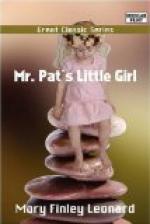“They reached the door; the boy had his hand on the knob. He was opening it very gently—when something happened! He stumbled, or his hand slipped. It flew open and there before them stood the magician, brandishing a glittering sword, and beside him were the gleaming eyes of a tiger.
“With a cry of terror the little girl fell all in a heap, grasping her scissors, shutting her eyes tight till all should be over. Then some one picked her up and asked if she was hurt, and slowly gaining courage she opened her eyes and looked into the kind face of Morgan, the cabinet-maker. At his side was Tiger, the great striped cat, and on the work-bench lay his shining saw. The boy stood by, laughing.”
“I thought he must be fooling her,” remarked Katherine, in a tone of relief.
“You don’t mean it!” said Maurice, with fine sarcasm.
“But finish, Miss Celia,” begged Rosalind. “What did the little girl think?”
“I believe for a long time she was greatly puzzled. There seemed to have been magic somewhere. She examined Tiger’s whiskers and found them all black, and this made her think it possible that some one else had cut out the white ones, and thus turned him into a harmless cat. She felt a little uneasy at times, for fear the cabinet-maker would turn again into the wicked magician, but it never happened.”
“And did she go on believing in fairies?” Rosalind asked.
“Oh, yes, for a while. I am not sure she doesn’t yet.”
“Cousin Louis says that is one of the advantages of the ‘Forest of Arden,’ you can believe in all those delightful things.”
“Were there fairies there?” asked Belle. “I don’t remember any.”
“There would have been if occasion had called for them,” Celia answered.
“But you don’t want to believe things if they aren’t true, do you?” Katherine looked puzzled. “I wish there were fairies now, but I know there aren’t.”
“You can’t prove there aren’t,” asserted Jack, mischievously.
“Why, Jack, you know there aren’t any fairies really.”
“I said you couldn’t prove it.”
“How can you say they do not exist unless you have seen one not existing? Isn’t that the argument in ’Water Babies’?” laughed Celia, as she carried the currants into the kitchen. “It is the difference between fact and fancy, Katherine,” she said, coming back.
“I love to pretend things,” said Rosalind.
“So do I,” echoed Belle.
“Fancy does more than that, it really makes things beautiful. For instance, it makes the difference between a plain, straight letter such as you see in the newspaper and such a letter as I was embroidering yesterday. Some one’s fancy saw the plain S ornamented with curving lines and sprays of flowers, and so it came to be made so.”
“That makes me think of those beautiful books the monks used to make,” said Maurice.
“The illuminated manuscripts, you mean? That word expresses what fancy does for us,—it illuminates the plain facts, and fills them with beauty.”




